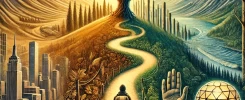The world is a vast canvas painted with the hues of diverse cultures, the shadows of conflicts, and the golden threads of economic pursuits. It is a mosaic that reflects the complexity of human existence, where nations intertwine like dancers in a grand ballroom, sometimes in harmony, often in discord. This narrative, born from an unstructured conversation, invites us to peer into the heart of these global themes, as if viewing the intricate mechanisms of a clock through its glass casing.
Life is much like a symphony, with each culture contributing its unique melody. The Chinese, French, English, and Dutch, mentioned in the conversation, represent the diverse notes that together create a harmonious composition. One might imagine a market in Shanghai, a café in Paris, a pub in London, and a tulip field in Amsterdam—each a vivid representation of humanity’s shared yet distinct spirit. Richard E. Nisbett’s “The Geography of Thought” delves into how these cultural variations shape our minds, much like the different strokes of a painter’s brush.
Yet, beneath this beauty lies the ever-present shadow of conflict. “War is complicated,” a statement simple yet profound, encapsulates the struggles that have shaped human history. Wars, like storms, disrupt the tranquility of the landscape, leaving scars that take generations to heal. Governments, often portrayed as captains steering their nations, sometimes find themselves navigating the treacherous waters of ideology, territory, and power. Carl von Clausewitz’s “On War” reminds us that these battles are as much a test of strategy as they are a reflection of human nature’s darker tendencies.
Economics, often seen as the engine driving the modern world, weaves its influence through every aspect of life. “Everything is about money,” the transcription suggests, echoing the truth that wealth dictates power, opportunities, and even relationships. Consider the bustling trade routes of history or the towering skyscrapers of financial districts today—monuments to humanity’s pursuit of prosperity. Thomas Piketty’s “Capital in the Twenty-First Century” provides a lens to examine the ever-widening chasm of wealth inequality, a topic as relevant as the currency in our pockets.
Powerful nations, like giants on a chessboard, exert their influence over the world stage. The mention of the U.S. in the conversation symbolizes the enduring dominance of some players in the geopolitical arena. But the game is changing. The rise of countries like China and India signals a shift in power dynamics, much like tectonic plates gradually altering the Earth’s surface. Fareed Zakaria’s “The Post-American World” captures this evolution, urging us to rethink the narrative of global dominance.
Amidst these grand themes, there lies the beauty of human connection—a thread that binds us all, even in fragmented conversations. Casual remarks like “Legendary Digger” or “very special” reflect the wonder and spontaneity of our interactions. These moments, though fleeting, are like fireflies in the night—small yet luminous. Catherine Blyth’s “The Art of Conversation” celebrates this art, reminding us that even in disarray, communication is the glue that holds societies together.
Learning often emerges from the most unexpected sources. A casual phrase can spark a profound realization, much like a seed that grows into a towering tree. Malcolm Gladwell’s “Blink” explores the power of these snap judgments, the instant connections that often reveal deeper truths. In this way, even the most unassuming interactions become gateways to understanding.
The conversation also invites us to reflect on our shared journey, much like a traveler pausing to admire the horizon. Themes of cultural appreciation, governmental influence, and economic interdependence remind us that we are all threads in a vast tapestry. Hans Rosling’s “Factfulness” offers a hopeful perspective on this interconnectedness, challenging us to see the world not through the lens of despair but with informed optimism.
Ultimately, life is a dance between chaos and order, a perpetual balancing act where every step counts. This transcription, with its scattered phrases and seemingly unrelated themes, mirrors the unpredictability of existence itself. Yet, it is precisely this unpredictability that makes life worth exploring. By engaging with ideas from books, conversations, and experiences, we equip ourselves to navigate the complexities of our world with grace and empathy.
Let this reflection be a call to action, a reminder to look beyond the surface and embrace the richness of human experience. What stories will you uncover in the symphony of life? What truths will you find in its quiet moments? Perhaps, like a legendary digger, you will unearth treasures that inspire and transform.
Bibliography
Blyth, C. (2009). The Art of Conversation: A Guided Tour of a Neglected Pleasure. Gotham Books.
Clausewitz, C. von. (1984). On War (M. Howard & P. Paret, Eds. & Trans.). Princeton University Press.
Gladwell, M. (2005). Blink: The Power of Thinking Without Thinking. Little, Brown and Company.
Nisbett, R. E. (2003). The Geography of Thought: How Asians and Westerners Think Differently…and Why. Free Press.
Rosling, H., Rosling, O., & Rosling Rönnlund, A. (2018). Factfulness: Ten Reasons We’re Wrong About the World—and Why Things Are Better Than You Think. Flatiron Books

